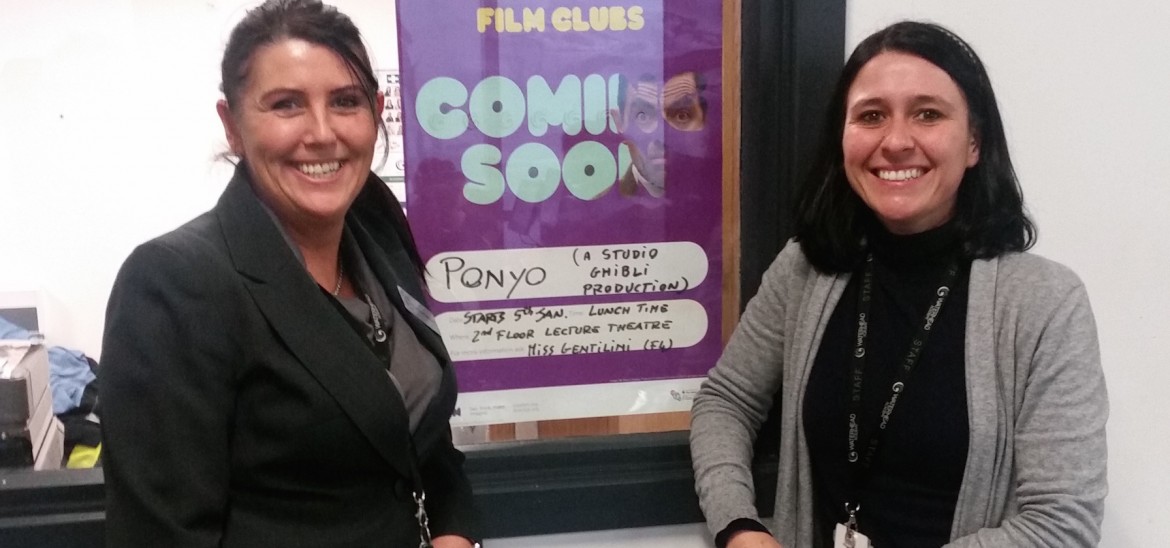Into Film Clubs
Find out everything you need to know about starting an Into Film Club.



Our Leader of the Month for January 2017 is Ania Gentilini, a teacher from Waterhead Academy in Oldham, who has been running her film club for two years now. Ania's club has found significant benefits in short filmmaking projects and film festival visits, and runs sessions both after school and during lunch breaks. Given the club is run during very short lunch periods, Ania's efforts provide a fantastic example to any prospective club leaders who might worry that they don't have time to host a film club. Below, she discusses these facets of her club, and reveals exactly how she fits sessions into a 35 minute lunch period.
We [Ania and fellow teacher Julie Flanagan] run our club both after school and at lunch times, and each has a different aim. I always enjoy giving the opportunity for students to do something fun and relaxing during our lunch screenings and on different educational trips we've been on, offering an enjoyable and, at the same time, educational break from lessons, whereas during the after school sessions, I like to see students working together and feeling proud about their work.
For the Opening Minds, Transforming Lives (OMTL) project, funded by Big Lottery Fund our students did several activities, including writing film reviews, which enhanced their analytical and writing skills, and drama activities, which built up their confidence in performing in front of other people. They also did a light workshop, during which they started to gain a wider understanding of how to use a manual camera. During all these workshops, they were asked to work in small and large groups and come up with original ideas. As such, the activities were very useful in improving teamwork skills and boosting creativity.
However, what I believe to have been the turning point for us (both students and myself) was when we did a session about making short films that had to follow certain guidelines. The students were given a topic, the option to use props, record five shots, and meet a specific length of the movie. They hugely enjoyed this activity. In addition, when the short films were shown in assembly, everyone was so excited about it that they wanted to continue with the club in order to learn more about how to make movies.
Prior to these workshops, I did not have an after-school club, and if it hadn't been for this OMTL project, I probably would never have started one in the way I did. After having a first go in making a short film last year, we are now working extremely hard to make a short movie to enter Into Film's Film of the Month competition. Thus, I would say that for us, this project definitely opened minds and transformed lives.
We also went to the Greater Manchester on Film Festival (GMOFF), which was also run through OMTL, to watch Next Goal Wins. The students really loved this educational trip. We had the chance to visit the National Football Museum, which they had never seen before, and the film was incredibly educational and made them think about being resilient. 'Never give up!' was the phrase mentioned the most in their reviews. Meeting the producer was also very interesting, and they asked him a lot of questions about the film industry and how the movie was made.
We also went to Manchester Library to see The Martian, where I had a group of 30 students, and again, many of them had never seen Manchester Central Library before, which is a very historic and important building for the city. Students absolutely loved the Q&A session that followed the screening. They asked a lot of questions about the film and the science behind it. One of our students even won a copy of The Martian novel for asking the best scientific question, which was a great reward for the student and the school. Everyone enjoyed it so much that the science department decided to offer a similar experience to the whole school, showing The Martian to all different year groups and running activities related to it during science week.
Film festivals are slightly different from just going to the cinema. I believe they offer the opportunity to experience movies in a different way because screenings are often located in interesting places and introduced by a talk or followed by a discussion. Sometimes, you get the chance to meet producers, actors or directors and these are all very positive experience for students since they give the opportunity to get directly involved in the event. This makes the film more real, and it might also stimulate students' interest in the industry as a future career.
I have used all the tips that Into Film have given to me in terms of where to find the right films to watch and information on how to make short movies and shared these with the students during our after-school meetings. We researched and planned the activities we want to do together so that I don't need to do a lot of planning or spend extra time on it. Everything is organised and decided during the club sessions. I would highly recommend to use all the Into Film resources, videos and guidelines, because they are extremely useful.
When we changed from a one hour to a 35 minute lunch break, I thought that would have not been long enough to run the film club, but I gave it a go anyway and it was a great success. It might take four or five weeks to finish a movie, but the members don't mind at all. In fact, they enjoy it a lot.
To have a prompt start, I have students who stay at the door and let only pupils with passes get in, while I get everything ready. Pupils can bring their food so they can watch the film while eating lunch in the lecture theatre. At the end, they leave row by row and while my colleague is at the end of each row with a black bin bag to check that no rubbish is left behind, I stay at the door giving out the passes to use for the following week. In this way, those who do not comply with the rules will not receive a film-club pass back. I change the passes every time I show a new film and new students who want to join need to collect the pass directly from me, so I can keep a track of how many students might turn up for the screening. And if they misbehave, they know they will not be able to attend.
We have had up to 80 students attending and it all ran smoothly, so I would highly suggest trying it, regardless of time restrictions in your schedule. It also helps to select movies that you enjoy as much as the students so it is also a break from work for yourself! It took a few attempts to put the system in place and get organised, but it has become a very nice lunch break for everyone and we love it!
Each month we celebrate one Into Film Club's achievements and talk to the club leader about how they approach their sessions.
View other Articles in this columnViewing 4 of 4 related items.

Get in touch with your article ideas for the News and Views section.